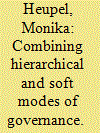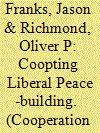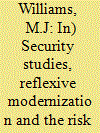|
|
|
Sort Order |
|
|
|
Items / Page
|
|
|
|
|
|
|
| Srl | Item |
| 1 |
ID:
080899


|
|
|
|
|
| Publication |
2008.
|
| Summary/Abstract |
In the wake of 9/11, the UN Security Council (SC) set out to urge every UN member to strengthen its domestic capacity to counter transnational terrorism and the heightened risk of weapons of mass destruction (WMD) proliferation to non-state actors. This article examines the modes of governance the SC applied - in terms of both setting and implementing rules - to influence states' activities in response to these two security threats. The far-reaching, generic, legally binding obligations imposed on every UN member were unprecedented and indicate a `hierarchical' approach. Yet, the SC - partly deliberately, and partly out of necessity - drew extensively upon a range of `soft' governance modes to support implementation and enhance the legitimacy of its approach. It remains to be seen whether this approach will be the precursor to a future trend. However, its usefulness will depend on whether the SC members will come to an agreement on how to implement `legislative' resolutions, and whether non-Council members will be granted greater influence in SC decision-making. Although more empirical research is needed on the SC's application of different modes of governance, these results contribute to a better understanding of the use of governance modes by international organizations other than the European Union
|
|
|
|
|
|
|
|
|
|
|
|
|
|
|
|
| 2 |
ID:
080902


|
|
|
|
|
| Publication |
2008.
|
| Summary/Abstract |
The liberal peace framework aims to regulate, govern and empower the individual in a democratic and pluralist milieu. Yet liberal peace-building, even on the scale and depth employed in the international governance of Kosovo, is susceptible to local cooption, particularly where one group can adopt the language of the liberal peace and has strong support and credibility from the international community. This has led to a focus on achieving statehood for Kosovan Albanians, the marginalization of other identity groups and their agendas, and consequently the undermining of the pluralist goals of peace-building with the implicit cooperation of liberal peace-builders. Given Serb opposition to statehood for Kosovo, there is a danger that liberal peace-building will encourage the partition of Kosovo rather than create a pluralist polity. The article illustrates the susceptibility of liberal peace-building to local cooption
|
|
|
|
|
|
|
|
|
|
|
|
|
|
|
|
| 3 |
ID:
080901


|
|
|
|
|
| Publication |
2008.
|
| Summary/Abstract |
At the dawn of the twenty-first century, the overwhelming challenge that confronts Western policy-makers is the management of diverse, amorphous and qualitative security risks, rather than the fixed, quantifiable threats of yesteryear. As such, policy-makers have had to move from a reactive to a more proactive mindset, which ultimately challenges established international institutions and norms of action. This change has been seen at both the domestic and international levels and gained prominence with sociologist Ulrich Beck's Risk Society thesis in the early 1990s. The risk paradigm calls into question many commonly used concepts in international relations (IR), such as established forms of cooperation and the utility of force. Because such a burgeoning security studies research agenda, inspired by Beck's writing, has begun to develop, I examine this new literature and the challenges that the Risk Society paradigm poses to IR as an academic study. I also raise the need to reconsider thinking surrounding the use of force, security cooperation and international law in light of the security risks and challenges that confront the West today.
|
|
|
|
|
|
|
|
|
|
|
|
|
|
|
|
| 4 |
ID:
080900


|
|
|
|
|
| Publication |
2008.
|
| Summary/Abstract |
This article examines Russia's response to the 1999 Kosovo crisis in order to evaluate theoretical propositions about the relationship between historical memory and conflict-causing misperceptions. For decades, Russian society consumed, especially through mass education, a particular interpretation of Russia's imperial wars and interventions in the Balkans and its historical relations with Serbia and the West. A comparison of the content of this view to the Russian elite and popular response to the 1999 Kosovo crisis shows how particularly pernicious historical ideas influenced a number of serious misperceptions about Balkan realities and Western motives in 1999. The case reveals that historical memory is more far-reaching than accounted for by traditional theories of misperception. Those theories, when they do incorporate historical memory, ignore or minimize the role of popular historical ideas as independent causes of misperceptions; perceptual distortions result largely from cognitive limitations in the processing of information, hence little can be done to avoid them. This study shows how historical ideas themselves may be a source of misperceptions. This has important policy implications: since historical beliefs are hardly immutable, efforts taken to scrutinize and challenge particularly pernicious interpretations of the past could help avoid conflict-causing perceptual distortions
|
|
|
|
|
|
|
|
|
|
|
|
|
|
|
|
|
|
|
|
|